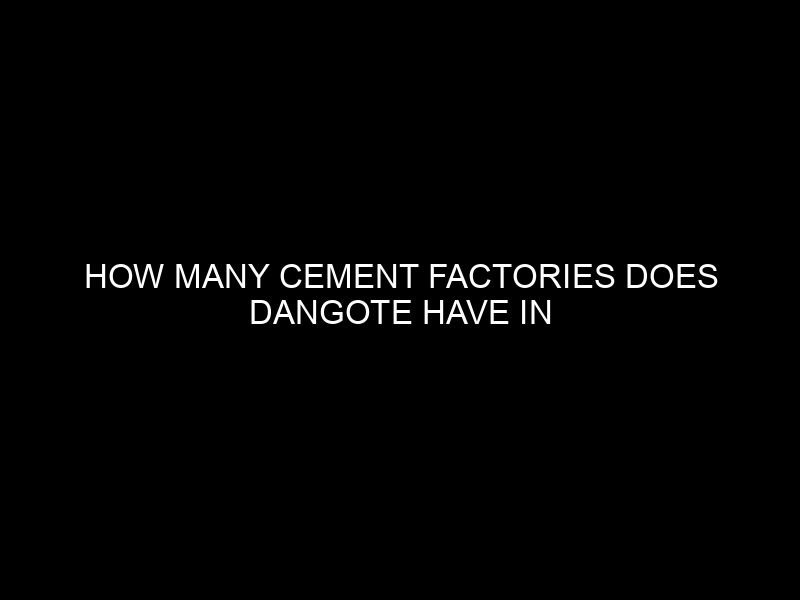As a professional with extensive experience in the Nigerian business landscape and a deep understanding of the Dangote Group, it’s my pleasure to share insights into one of the country’s most significant industrial sectors – cement manufacturing. The Dangote Group, founded by Aliko Dangote, is not just a household name in Nigeria but also a colossal figure in the global business community. This article aims to explore the number of cement factories owned by the Dangote Group in Nigeria, delving into their strategic importance and impact on both the local and international markets.
Dangote Cement: A Cornerstone of Nigeria’s Industrial Sector
Dangote Cement, a subsidiary of the Dangote Group, is arguably the most dominant and influential player in the Nigerian cement industry. The company’s journey, spearheaded by Aliko Dangote, Africa’s richest person, is a testament to the potential of African enterprise in the global market. To understand the scope of Dangote Cement’s operations, it’s crucial to look at the number of factories they operate within Nigeria and the capacity of these facilities.
The Proliferation of Dangote Cement Factories in Nigeria
As of my last update, the Dangote Group operates several cement plants across Nigeria. These include:
- Obajana Cement Plant, Kogi State: Often touted as the largest cement plant in Sub-Saharan Africa, the Obajana Cement Plant in Kogi State is a behemoth in cement production. With several production lines, its capacity runs into millions of tonnes per annum, contributing significantly to meeting Nigeria’s cement demand and even catering to export needs.
- Ibese Cement Plant, Ogun State: Another major Dangote cement factory is located in Ibese, Ogun State. This plant also boasts multiple production lines and plays a critical role in serving the Southwestern market of Nigeria.
- Ggboko Cement Plant, Benue State: Situated in Benue State, the Gboko plant adds to the total output capacity of Dangote Cement in Nigeria, primarily serving the Middle Belt and providing employment opportunities to the local population.
- Additional Facilities and Expansion Plans: Dangote Cement doesn’t stop at these major plants. There are ongoing expansions and potential new projects in the pipeline, aimed at increasing production capacity and geographical reach within Nigeria and across the African continent.
Strategic Importance and Market Impact
Dangote’s cement factories are not just manufacturing hubs; they are strategic assets in Nigeria’s quest for industrialization. These plants:
- Boost Local Economy: By creating jobs and fostering local supply chains.
- Reduce Import Dependence: By meeting local demand, Nigeria reduces its reliance on imported cement.
- Enhance Export Potential: Surplus production capacity allows for exports to neighboring countries, earning foreign exchange for Nigeria.
Challenges and Opportunities
While Dangote Cement has been a success story, it faces challenges like logistical hurdles, energy supply issues, and market competition. However, these challenges also present opportunities for innovation, such as using alternative energy sources and improving supply chain efficiency.
Frequently Asked Questions (FAQs)
- What is the production capacity of Dangote’s cement factories in Nigeria? Each factory’s capacity varies, but collectively, they contribute immensely to Nigeria’s and Africa’s cement output.
- How does Dangote Cement contribute to the Nigerian economy? Beyond direct employment, Dangote Cement contributes to the GDP, aids in infrastructure development, and reduces foreign exchange expenditure through local production.
- What are the future plans for Dangote Cement in terms of expansion? The Dangote Group is continuously exploring new opportunities for expansion, both within Nigeria and in other African countries.
- How has Dangote Cement impacted the global cement industry? Dangote Cement has set a precedent for African companies, showcasing the continent’s ability to compete on a global scale in heavy industries.
- What makes Dangote Cement a leader in the Nigerian market? Factors include its large production capacity, strategic location of plants, continuous innovation, and a strong distribution network.
Conclusion
In conclusion, Dangote Cement’s role in Nigeria’s economic landscape is monumental. The exact number of cement factories they operate in Nigeria is a testament to their commitment to industrial growth, economic development, and infrastructural advancement in the country and beyond. As the company continues to expand and innovate, it stands as a beacon of African enterprise in the global market.

Leave a Reply